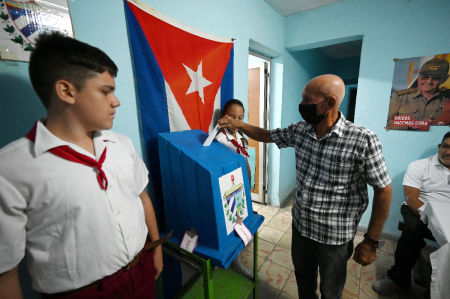Cubans vote to legalize same-sex marriage, adoption in family code

Cubans on Sunday voted to approve a new "family code" that, among other things, legalizes same-sex marriage and adoption. The 100-page code is one of the most progressive in Latin America.
Millions of Cubans voted in the referendum on the government-backed proposal that allows same-sex couples to marry and adopt on the communist-run island amid a deepening economic crisis.
Cuban President Miguel Diaz-Canel spoke to journalists after casting his vote, saying that the code abolishes prejudices and taboos that have been ingrained in Cuban society.
"My expectation is that most of the population will vote 'yes,'" Diaz-Canel was quoted as saying by Reuters. "But regardless of whether 'yes' or 'no' wins ... the popular debate that has been generated has contributed to our society."
Cubans aged 16 or above were eligible to vote, and the bill required more than 50% of the votes to pass.
State media on Monday morning announced what were said to be near-complete figures, suggesting that up to two-thirds voted in favor of the new code.
The code underwent over two dozen drafts as nearly 80,000 town hall-style meetings were held and over 300,000 public comments were received, AFP reported.
Cuba has been a one-party state under the Communist Party of Cuba since the late dictator Fidel Castro overthrew the United States-supported dictatorship of Fulgencio Batista in 1959.
In 2008, Castro's brother, Raul Castro, was elected president, followed by Miguel Díaz-Canel in 2019.
Fidel Castro was known for rounding up both religious people and LGBT people, putting them in labor camps following his 1959 revolution. However, his niece, Mariela Castro, has been one of the leading figures behind the Cuban LGBT rights movement. She is the director of the National Center for Sex Education, which has backed same-sex marriage.
Weeks before the referendum, the Cuban Conference of Catholic Bishops announced its opposition to several points in the new code, including surrogate pregnancies and adoption by same-sex couples.
In the week leading up to the vote, the Cuban government reportedly used state-run media to promote stories and photos urging Cubans to approve the new rules.
Cuban Evangelicals have long voiced their opposition to same-sex marriage. In 2018, when a Constitutional amendment was proposed to make matrimony gender neutral in Article 68, Cuba's evangelicals warned against it.
"If this is approved, our nation is going to total destruction," Alida Leon Baez, president of the Cuban Evangelical League Church, said at the time.
"We do not in any way approve Article 68 ... because the Bible condemns it," added Pastor Lester Fernandez of the Methodist Church in Havana.
According to the Pew-Templeton Global Religious Futures Project, about 59% of Cubans are Christian.
Cuban Christians face constant government surveillance and infiltration despite the faith growing on the island.
The Cuban government amended its Constitution in 1992, declaring it a secular state instead of an atheist state, partially allowing religious activities. Since then, the percentage of the country's population that identifies as Christian has grown.
However, the communist regime continues to persecute Christians. A new constitution was adopted in 2019, which lists the country as a secular state.
Sunday's referendum was held amid the country's worst economic crisis in 30 years, marked by shortages of food, gas and medicine.
Last July, the people of Cuba demonstrated their anger against the government in what was said to be the largest protest in decades amid shortages of medicine and food during the pandemic.
International travel restrictions and the monthslong COVID-19 lockdown within the country compacted the country's already spiraling economic crisis at the time. After the protests erupted, President Diaz-Canel addressed the nation, urging the regime's supporters to confront the protesters on the streets. He also accused the U.S. of causing the crisis in Cuba by imposing sanctions.
Many religious leaders were also targeted, arrested and beaten during the protests.






















